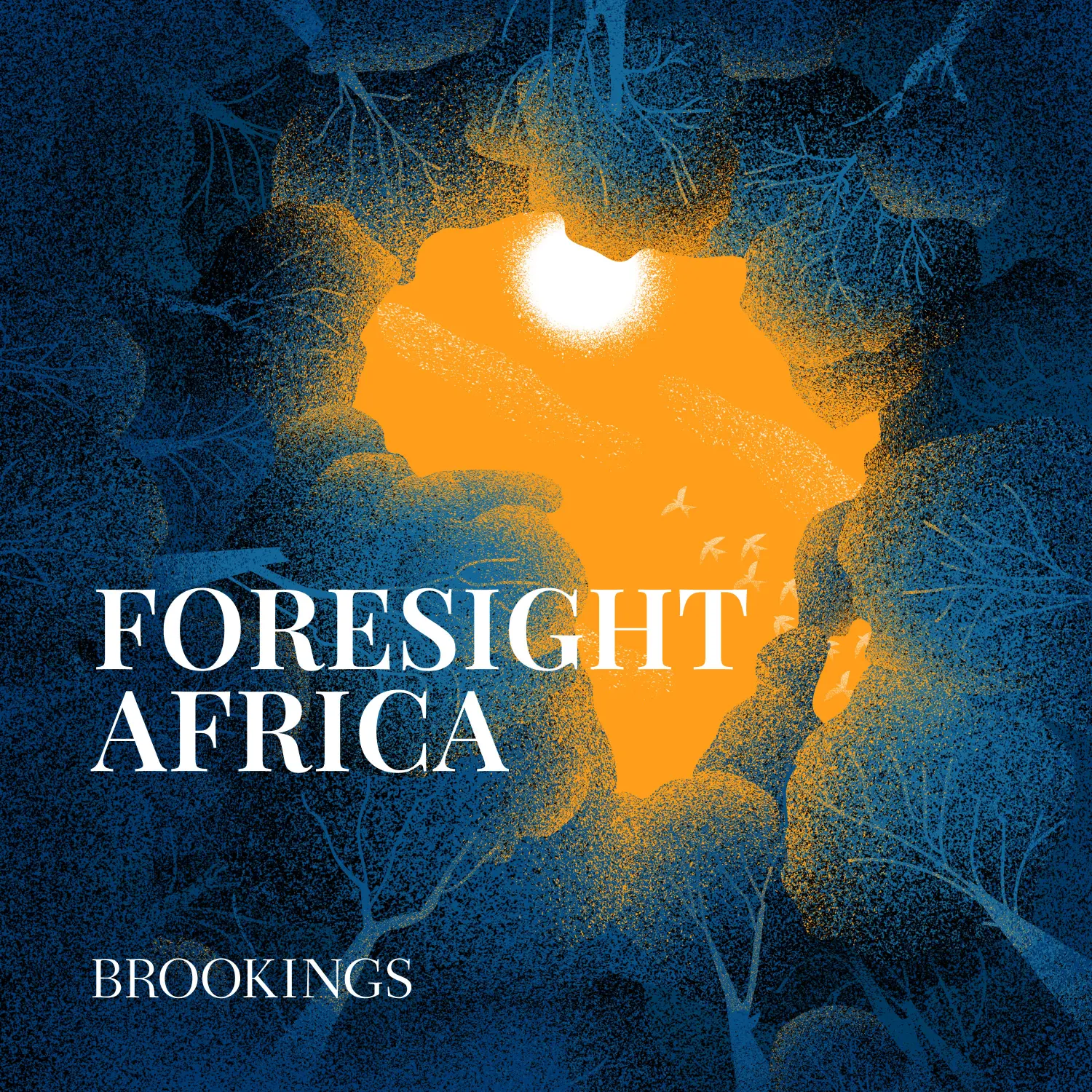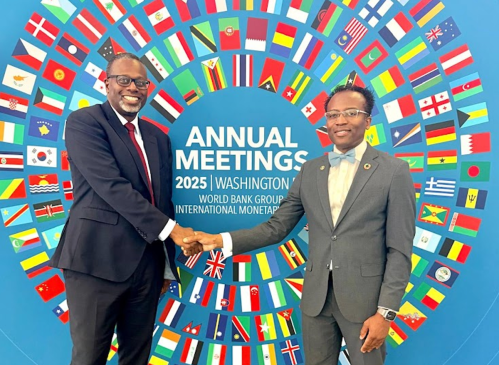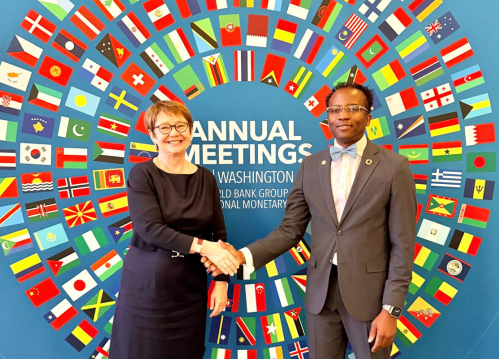From October 13-18, the World Bank and International Monetary Fund hosted their 2025 Annual meetings, gathering prominent figures in development finance from around the world. Foresight Africa was on the scene throughout the week to speak to some of these influential leaders making and shaping policy throughout the world.
In this interview, host Landry Signé speaks with Arthur Minsat, Head of the Unit for Africa, Europe and the Middle East at the Organization for Economic Cooperation and Development’s (OECD) Development Centre. Dr. Minsat has worked on development economics in Africa, including at the U.N. Development Programme and with the U.N. Operations in Côte d’Ivoire (ONUCI).
Transcript
LANDRY SIGNÉ: Hello, I am Landry Signé, a Senior Fellow in the Global Economy and Development Program and the Africa Growth Initiative at the Brookings Institution. Welcome to the Foresight Africa Podcast, where I engage with distinguished leaders in academia, policy, business, and civil society to share their unique insights and innovative solutions to Africa’s challenges while highlighting also incredible opportunities to advance engagement between Africa and the rest of the world.
Today we are fortunate to be meeting on the sidelines of the World Bank Group and International Monetary Fund’s Annual Meetings: a yearly gathering of the world’s most influential leaders in the development finance space, and these include central bankers, finance ministers, but also heads of global and regional institutions, corporate CEOs, entrepreneurs, and civil society leaders. Welcome to the Brookings Institution Foresight Africa Podcast!
ARTHUR MINSAT: Thank you, Landry! A pleasure to be here.
LANDRY SIGNÉ: Before we begin, could you please state your full name and your title?
ARTHUR MINSAT: I’m Arthur Minsat, Head of the Africa Unit, Europe and Middle East at the OECD Development Center. Pleasure to be here.
LANDRY SIGNÉ: Amazing. So I am delighted to have you join us during this hectic time, and we truly appreciate you taking the time to share your words of wisdom with our audience. As you take part in this year’s Annual Meetings, which priorities do you see as the most essential for driving sustainable and inclusive growth worldwide and why?
ARTHUR MINSAT: So for Africa, I’ll focus on education, infrastructure and sustainable debt management in the future. On infrastructure, we are seeing that if African countries were to invest about the same as China or Vietnam they could more than double their GDP growth.
They would add 4.5 percentage point to the annual GDP growth by investing 5.6% of the annual GDP in productive infrastructure. By 2040, that would more than double Africa’s GDP. So having targeted investment for Africa’s productive transformation is important for Africa to create jobs to increase productivity, but also for the rest of the world because they are major opportunities for investment in the continent. And to continue with the global growth. So that’s the first element is infrastructure and investment in infrastructure.
Second is on education. There is much progress that has been made in education. But at the same time, we measure education by the quantity of the learning. We still see that the gap between the African continent is larger than with African regions, yet investment in education and smart investment in initiatives that can really make a difference, such as training the trainers, targeted pedagogy has more returns on investment at the macro and at the microeconomic level in African countries than in other parts of the world. Of course there are many different situations. If you take countries in Southern Africa, in North Africa and you compare them with other parts of the African continent. But what is interesting is that the, for example, the gap between quality education, the quality of learning, although you have higher length of schooling in North African countries.
The quality of the learning is dropping more than in other parts of Africa. When you’re accounting for the quality of what pupils have actually learned at schools in terms of reading, writing and counting, for example, and particularly for girls where they tend to have better scores than boys, but the insertion in the labor markets is not as high as for boys, particularly in North Africa. So that second priority is really important for inclusive growth on the continent.
And the third one is going to be the next team of our flagship product led by the African Union Commission in collaboration with the OECD Development Center is on sustainable debt. And so in times where there’s a tightened fiscal space the tax-to-GDP ratio has improved, but it’s still stagnating at about 16% of the continent’s GDP. With volatility and uncertainty in global markets and increasing also high cost of capital for African countries, we estimate that the cost of financing debt is seven times more than the financing that goes into infrastructure. So it’s really important gap. And the big question is how to reduce the cost of debt and of servicing the debt.
LANDRY SIGNÉ: Insightful. I really like the comprehensive approach. What insights or lessons from these discussions or from your broader work should Global Leaders act on to strengthen resiliency and address the most pressing economic and social challenges, either globally or in Africa?
ARTHUR MINSAT: Let me start with Africa. So the first issue is how to crowd in more investment and particularly more private investment.
If we look at infrastructure, private investment, finances only 7% of total infrastructure finance. So while we don’t have good data to be able to reliably compare with other world regions we know that it’s not enough because private investment at the global level into infrastructure has tripled in the last 10 years, but in Africa has been able to only retain 7% on average.
So the share of the pies has remained constant throughout the years, despite the huge opportunities that you see on the continent. The default on infrastructure is about 2%. If you compare with Latin America, it’s more than 10%. Yes. If you look at the returns on investment, it can be up to 20%.
So huge opportunities, but big risk perception and therefore the private sector has difficulties moving in. And that’s really important because at the global context we are in, in a political economy where overseas development assistance is being questioned, where one wants to reallocate and move from aid to investment.
The role of the private sector there is really important. Because the tools to promote and crowd in private investment in emerging and developing economies are not sufficient or not always there to be able to reassure the private sector that they can invest. The big question here is how to move this conversation to really move into action.
So I can talk about guarantees, for example, in order to reduce the risk, but then the guarantees may not be enough, or one guarantee would provide a guarantee to one large project, but not. To the small and middle-sized enterprises that are the ones that create jobs, or a guarantee will mean also that the money is sitting somewhere in the bank account and is not directly invested into the economy. They are just there to lower the risk. So these are some of the key questions because the tradeoffs need to be looked at in a context where there is also more global uncertainty. For example, when we see that investment in the United States has continued to increase, a lot of this increase was driven by investment into artificial intelligence and that also has impact on the African countries that wants to invest more in in artificial intelligence in order to industrialize and to leapfrog and to benefit from the new industrial revolution through telecoms and other new technologies. So there is a lot of a need to better understand the trade-offs in order to increase productivity across the board and make sure that the productivity gains will also be inclusive to create quality jobs for people, particularly where we have large, informal economies, which is the case in many countries on the African continent, up to 86% of the labor force can be in the informal sector depending on how we measure it.
So these are some of the big questions to enable the small and middle-sized firms to to be able to grow and unlock the huge opportunities that we see in the African continent. There are tectonic shifts happening at the moment in Africa, including in urbanization, growth of middle class, continental food trade area with the common markets. The youthful population: 86% of the demographic growth in the next 10 years will come from Africa. So with lots of opportunities, but as mentioned because of high risk perception that tend to be underrated and not enough used by global players
LANDRY SIGNÉ: Insightful and I really like how you emphasize the critical role of the private sector. How are international, financial and situations adapting their mandates and instruments to an evolving geopolitical trade and economic landscape, and where can they most effectively lead transformative change?
ARTHUR MINSAT: So key here is blended finance in order to attract and crowd in private investments. Blended finance can come with many different tools and approaches.
One issue is that what we’ve been talking from, of going from billions to trillions the amounts have not been able to be leveraged. So the tools that we are looking at need to be carefully adapted to the local context and making sure also that we can have different types of investors that we can work together with.
So if we look at the infrastructure in Africa, for example. Secondary markets are not sufficiently developed. Capital markets are not sufficiently developed in order to crowd in private investments and crowding investments from venture capitalism, but also from more institutional players like pension funds, institutional investors that need more secure capacity, harmonized legislative frameworks between the countries in order to feel that they are safe enough to invest and to reap the opportunities. So for these types of actors might be more difficult to invest and to enter these markets. But then once they are there, the returns on investment are high. So better understanding the tradeoffs and the information, the data and the insights from the stakeholders is really important.
At the OECD, together with the African Union Commission, we have launched this year an African virtual investment platform that aims to provide data, information, insights on the investment landscape for a first set of 10 African countries that we will brought into the entire continent in order to better understand the risks and the opportunities.
Because we think that having more transparency or accountability more ownership we’ll also be able to crowd in more private investment and having the right approaches between public actors and private actors, African actors and international actors to really make a difference and level increase the level playing field for the African continent and African people.
LANDRY SIGNÉ: Fantastic. And what bold actionable ideas from this week do you see shaping global policy and practice, and how do you plan to translate them into tangible outcomes? Either the OECD in general, but also your stakeholders.
ARTHUR MINSAT: So in terms of tangible of bold ideas I will repeat what I said in the beginning, which is we think there’s a huge opportunity with infrastructure investment on the African continent.
As mentioned returns can be very high up to 20%. And, but they are not drift at the moment because the cost of capital is too high. So we compare the cost of capital between Africa and developing countries in Asia and Latin America, and the OECD countries. For the African continent, the cost of capital debt equity, and across different types of infrastructure transport, maritime energy rail water is 13% compared to OECD countries, 8%.
So there’s, it’s a big. A bold step to make it is to having the tools, the information, the exchanges with the stakeholders to reduce that cost of capital. That’s going to be a long, painstaking work together with African government and the private sector. But that’s really important to reduce the cost of capital.
We also see it in the debate on debt. Yes. That needs to be absolutely reduced. It’s vital. Capital is too expensive. And this is, so this is when you look at the glass being half empty. But when you look at it being half full, the big opportunity is one can double – more than double – Africa’s GDP growth every year by having the right types of investment in infrastructure in particular, but also of course in education.
As mentioned for infrastructure we think that we can increase annual GDP growth by 4.5 percentage points. So that’s huge because that means the African continent will grow by more than 7% a year, doubling GDP every 10 years. And we would see a very different Africa in 2040 than what we are today are where we’ve been 10 years before now.
So there’s a lot of progress, and that can continue to accelerate with big ideas and with the right approaches. And by working together with stakeholders, of course, driven by African local actors. Small and middle-sized enterprises, larger firms, but also with international partners who can bring the scale needed and the technology transfers that are needed for industrialization.
LANDRY SIGNÉ: What a beautiful way to conclude. Thank you so much for joining me today.
ARTHUR MINSAT: Thank you, Landry. Such a pleasure having me and honored to be with you. Thank you.
LANDRY SIGNÉ: Amazing.
-
Acknowledgements and disclosures
The Foresight Africa podcast is brought to you by the Brookings Podcast Network. Send your feedback and questions to [email protected]. Special thanks to the production team including Fred Dews, producer; Dafe Oputu, and Nicole Ntungire, associate producers; Gastón Reboredo, audio engineer; and Izzy Taylor, communications manager in Brookings Global. The show’s art was designed by Shavanthi Mendis. Additional promotional support for this podcast comes from my colleagues in Brookings Global and the Office of Communications at Brookings.
The Brookings Institution is committed to quality, independence, and impact.
We are supported by a diverse array of funders. In line with our values and policies, each Brookings publication represents the sole views of its author(s).






Commentary
PodcastBrookings AGI at the Annual Meetings: The OECD on infrastructure, education and sustainable debt for Africa
November 20, 2025
Listen on
Foresight Africa Podcast